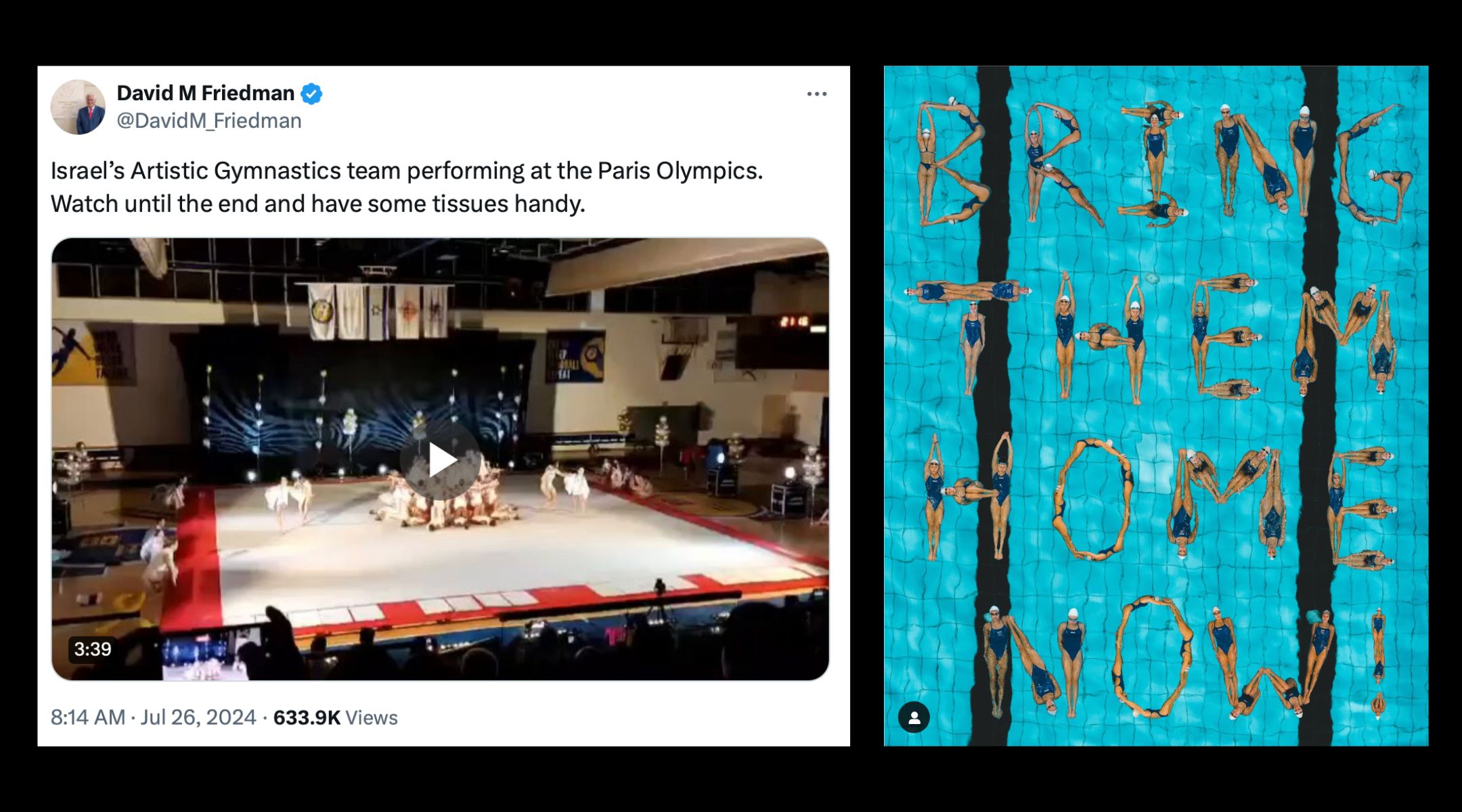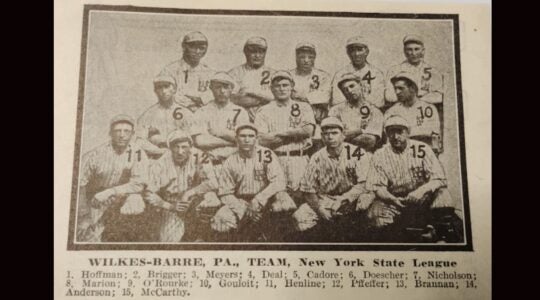Sharing what he said was a video of Israel’s national gymnastics team performing a “Bring Them Home”-themed routine at the Paris Olympics, former U.S. ambassador to Israel David Friedman had one piece of advice to viewers: “Watch until the end and have some tissues handy.”
The video shows a group of gymnasts performing a routine featuring Israeli flags, a large yellow ribbon and signs reading “Bring them home now” — all set to a song that was composed for a concert to raise awareness for the Israeli hostages taken by Hamas on Oct. 7. Friedman billed the video as showing “Israel’s Artistic Gymnastics team performing at the Paris Olympics.”
Friedman’s tweet, which he shared with his 59,000 followers, has been seen 630,000 times and shared more than 2,000 times, according to X, the network formerly known as Twitter. It’s also been shared widely on Instagram, the visual social network that does not make public information about the reach of posts.
But while the video is no doubt evocative, it is not Israel’s gymnastics team, nor is it from the Olympics. According to the Israel Gymnastics Federation, the video shows a performance from an acrobatics club in Mazkeret Batya, Israel.
Israel only has two artistic gymnasts at the Paris Olympics; its rhythmic gymnastics team, which competes Aug. 9, only has five members, while the video features dozens of gymnasts.
Friedman did not respond to a Jewish Telegraphic Agency inquiry about how he came to share the video with the description he did. But the post offers the latest example of how misinformation about Israel, an ongoing issue during the Gaza war, is affecting even seemingly lighthearted posts connected to the Olympics.
Another widely shared visual ostensibly from the Olympics has been an image depicting Israeli swimmers arranged to spell out “Bring them home now!” with their bodies. According to one viral caption, the picture is of the Israeli team during a practice swim.
But the photo appears to show 58 swimmers — considerably more than Israel sent to the Olympics. And a closer look reveals that some of the swimmers repeat as the letters do.
In fact, the image is actually nearly as old as the hostage crisis, after being created and shared by artist Adam Spiegel on Instagram on Nov. 19. A note attached to some of its shares on X also suggests that the image may be digitally altered or made by artificial intelligence. Spiegel did not respond to a request for comment.
The picture has been used to amplify another viral claim that departs from the truth: that the Israeli national team has been uniquely prohibited from demonstrating during the Olympics on behalf of their country.
“The Israeli Olympic team is NOT permitted to proudly wear their #BringThemHome pins during the #2024Olympics,” the Instagram account JewsofNY told its 162,000 followers, in one representative post. “But that didn’t stop Israel’s Olympic swimming team from forming these important words together with the🎗️& ✡️ symbols during their practice in Israel.”
The claim that the Olympic committee “banned” Israel’s delegation from wearing pins is misleading. The International Olympic Committee’s official charter lays out policies concerning political expression from all athletes; there is no specific policy for Israel.
Rule 40 of the Olympic charter says that “all competitors, team officials and other team personnel at the Olympic Games shall enjoy freedom of expression.” But later in the charter, it clarifies, “No kind of demonstration or political, religious or racial propaganda is permitted in any Olympic sites, venues or other areas.”
The IOC has clarified that athletes are entitled to share their views during interviews or other media appearances, but that such expressions are prohibited during official ceremonies, competitions and in the Olympic Village.
The charter also says athletes or teams that break those rules or subject to temporary or permanent disqualification, including forfeiting any medals.
While some Jews and pro-Israel voices see the yellow ribbons that have proliferated since Oct. 7 as politically neutral, the ribbons have been treated as partisan statements on the world stage, including when a handful of celebrities have worn them at international awards ceremonies.
On Sunday, another piece of misinformation began spreading: about Karina Pritika, who was murdered on Oct. 7. “Our fellow X user, and Israeli rhythmic gymnast Karina Pritika, might have been competing at the Paris Olympics right now, but she was executed by a monster for being a Jew while pleading for her life on her knees after watching him murder her best friend,” an Israeli named Saul Sadka tweeted alongside video from Oct. 7.
In fact, although Pritika had represented Israel in international competitions as a teen, she had retired well before Oct. 7, when she was one of hundreds of young people slaughtered at the Nova music festival. Sadka later acknowledged that Pritika had retired but said he would leave the tweet online — along with anti-Israel responses, some vicious, that his post had elicited.
As the posts have spread across social media, some Jewish users have called out the proliferation of misinformation — though, as tends to be the case online, their responses are being seen far less than the misleading posts.
“Guys. Memes are fun. Misinformation isn’t,” tweeted rabbi and activist Shais Rishon, who goes by the moniker MaNishtana online. “Ppl keep sharing this but the image has absolutely zero connection to the Olympics.”
JTA has documented Jewish history in real-time for over a century. Keep our journalism strong by joining us in supporting independent, award-winning reporting.






